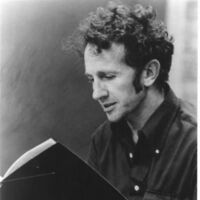On the Meeting of Garcia Lorca and Hart Crane
Brooklyn, 1929. Of course Crane’s
been drinking and has no idea who
this curious Andalusian is, unable
even to speak the language of poetry.
The young man who brought them
together knows both Spanish and English,
but he has a headache from jumping
back and forth from one language
to another. For a moment’s relief
he goes to the window to look
down on the East River, darkening
below as the early night comes on.
Something flashes across his sight,
a double vision of such horror
he has to slap both his hands across
his mouth to keep from screaming.
Let’s not be frivolous, let’s
not pretend the two poets gave
each other wisdom or love or
even a good time, let’s not
invent a dialogue of such eloquence
that even the ants in your own
house won’t forget it. The two
greatest poetic geniuses alive
meet, and what happens? A vision
comes to an ordinary man staring
at a filthy river. Have you ever
had a vision? Have you ever shaken
your head to pieces and jerked back
at the image of your young son
falling through open space, not
from the stern of a ship bound
from Vera Cruz to New York but from
the roof of the building he works on?
Have you risen from bed to pace
until dawn to beg a merciless God
to take these pictures away? Oh, yes,
let’s bless the imagination. It gives
us the myths we live by. Let’s bless
the visionary power of the human—
the only animal that’s got it—,
bless the exact image of your father
dead and mine dead, bless the images
that stalk the corners of our sights
and will not let go. The young man
was my cousin, Arthur Lierberman,
then a language student at Columbia,
who told me all this before he died
quietly in his sleep in 1983
in a hotel in Perugia. A good man,
Arthur, he survived graduate school,
later came home to Detroit and sold
pianos right through the Depression.
He loaned my brother a used one
to compose hideous songs on,
which Arthur thought were genius.
What an imagination Arthur had!

